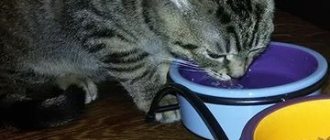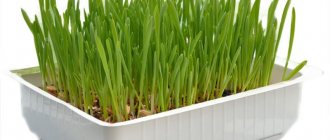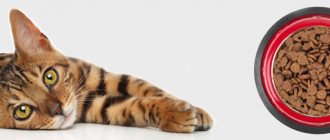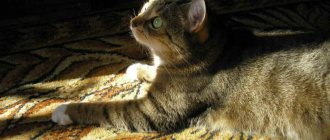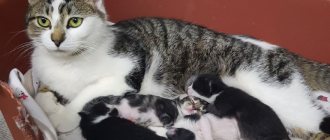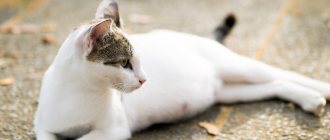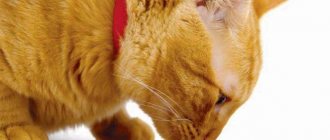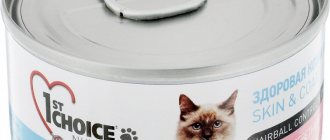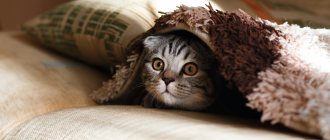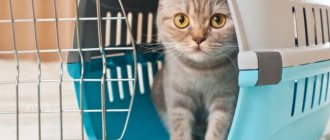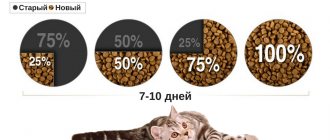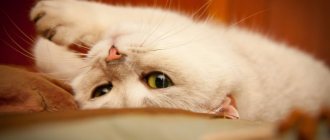April 27, 2019
Every problem has a cause, but in the case of pets, figuring it out is sometimes very difficult. The cat cannot answer the question of why he suddenly stopped loving the food that he used to eat with pleasure, so we have to figure it out based on indirect evidence. In this article we will tell you about the main reasons why the cat suddenly stopped eating dry food.
Reasons why cats stop eating dry food
With the advent of commercial pet food, many pet owners breathed a sigh of relief, believing that it was enough to choose the right brand once and the cat’s nutrition problem would be solved forever.
If a cat stops eating dry food, many people start to panic. What is the reason and what should the owner do?
The main probable reasons for refusing dry food:
- owners do not monitor the cleanliness of cat dishes and water,
- tired of food
- the pet's appetite has temporarily deteriorated,
- the quality of the feed has changed,
- the cat is seriously ill.
Cats don't eat, they feast on food. Make sure you don't get bored with the food
Another common reason why a cat has stopped eating dry food may be that the owners always offer the same taste. Try eating your favorite food three times a day for a month. Will it remain as desired and loved? What if you eat like this for a whole year? Most often, cats don’t eat, but treat themselves little by little. If your pet is tired of dry food, different flavors should be alternated .
Fortunately, now cat food is packaged in hermetically sealed bags; it will not spoil after opening the package.
It is also a good idea to diversify the diet by introducing wet food. After all, owners often accustom their animals to dry food, considering it the only complete source of all necessary substances. But this is a mistaken opinion. Pets always need additional sources of vitamins, as well as fresh grass to remove ingested hair from the body.
Stress in a cat's life is a likely cause of loss of appetite
The reasons why a cat refuses to eat dry food may be emotional in nature. It's time for March weddings, the summer heat, moving to a new apartment, a change of owner, the appearance of another pet in the house (and even the birth of a baby) can trigger a temporary refusal of food. What to do in such cases? Pay attention to the ward, try to create comfortable conditions, talk to him more often, stroke him.
On the hottest summer days, your pet may completely refuse to eat during the day, hide under the bathtub, look for other cool places, and only approach the bowl in the late evening.
If after a couple of days the animal does not start asking for food again, then the reason is more serious and you should contact a veterinarian.
In cases where the cat asks for food but does not eat, you should check the quality of the purchased products. If you are happy that you were able to get your cat used to dry food at a price that suits your needs, and now you have found it at a cheaper price, in fact, it may turn out that the cat will ignore it. Sometimes the same brand is produced by different factories . Depending on the country of origin, the composition of the raw materials changes and the cat may not like this taste, while the owner is guided in the choice by the picture on the package and may not realize to read the information written in small print on the box.
The main reasons why a cat refuses to eat
- Stress.
- Changing your diet.
- Thermoregulation.
- Sexual instinct.
- Pregnancy.
- Parasites.
- Oral diseases.
- Poisoning.
- Foreign body and fur in the stomach and intestines.
- Viral infection.
- Diseases of the liver, kidneys and urolithiasis.
- Postpartum period.
- Consequences of anesthesia.
Stress
Cats are exposed to stress no less, and perhaps even more than people. Moving to a new place of residence, a new bowl, rearranging the room, renovations, a business trip for the owner, or mood swings of the owner - all these are stressful situations for the animal.
Even the arrival of guests or a quarrel between family members can affect the cat’s well-being.
During stress, the cat is not active, she has an apathetic mood, she does not want to play with the owner, she eats poorly or refuses to eat at all. In such a situation, there is no need to force the animal to eat; refusing food for a couple of days is the norm.
Increased attention to the cat from family members, affectionate treatment, and new toys help in stressful situations. In severe cases, consultation with a veterinarian is necessary, who can prescribe sedatives to the animal.
But be careful: the cause of stress may be the onset of an illness.
Changing your diet
New food is stressful in itself. Cats are very picky eaters and are sensitive to any change in diet. A sudden transition from one type of food to another, or a change in the brand of dry or wet food, can lead to the animal going on a hunger strike.
The animal does not understand that the new food is of better quality and cannot appreciate the efforts of the owner. The cat is accustomed to a certain food, so it declares a “boycott” on any unfamiliar food.
Monitor the condition of the animal; if the cat looks healthy and drinks enough water, then you should not worry too much about such a “hunger strike”.
What diseases cause your pet to refuse to eat?
Sometimes a cat won't eat dry food because it hurts her to chew it. But at the same time, she does not refuse sour cream, cream, soft food, or pieces of boiled fish. Possible reasons:
- stomatitis,
- periodontal disease,
- tartar,
- tooth loss or decay.
Take your cat to the clinic and let the veterinarian check the condition of the oral cavity and prescribe treatment.
A variety of parasites can cause poor digestion. Flatworms, roundworms, fleas, lice eaters, and ticks can cause severe general intoxication of the body. Regular prevention of helminthic infestations using drops or tablets should become the norm . Special collars, dry shampoos, powders, and wet treatment help protect against fleas and other external parasites.
Pathological causes
There are also pathological reasons why a cat eats a lot and does not get enough, signaling serious changes in the body. This:
- impaired absorption of beneficial components due to congenital characteristics of the body or the presence of serious diseases - inflammation and intestinal cancer, exocrine insufficiency, pancreatic tumors;
- diabetes mellitus, which often affects pets;
- pregnancy and breastfeeding;
- helminthic infestation.
If the cat's constant hunger is not associated with pregnancy and worms, it requires specialized veterinary care. The presence of serious diseases affects the appearance of the animal - the cat eats a lot, but loses weight, becomes capricious, loses interest in active games, and its fur and teeth become unattractive.
It may be worth contacting a veterinarian
As a rule, most diseases respond well to treatment and require a balanced diet using special foods. You can detect the presence of the disease yourself, simply by observing your pet: the fact that the cat is always hungry, drinks a lot and often goes to the toilet indicates diabetes.
Problems with the gastrointestinal tract are indicated by vomiting and diarrhea. Of course, only a doctor can prescribe treatment!
Why doesn't my cat eat dry food?
When identifying the cause, you should first pay attention to the pet’s behavior as a whole. It is important to note whether the companion completely refuses food or eats, but little and reluctantly. In the first case, the likelihood of having health problems is higher. If your cat begins to eat less and this does not last long, there is most likely no cause for concern.
Health problems
Almost any disease can cause a deterioration in appetite or a complete refusal of food: infection, inflammation of the gastrointestinal tract, colds, etc. If the cat does not drink for more than 12–24 hours, you should urgently consult a veterinarian: the greatest danger is not hunger, but dehydration . Uncharacteristic symptoms may indicate the presence and specificity of the pathology: weakness, fever, vomiting, changes in urine and feces, etc.
If the cat is lethargic, sleeps most of the time, takes forced positions and reacts poorly to external stimuli, it needs to be taken to the vet urgently: such symptoms indicate a serious condition
If you notice that your cat is not eating enough, it is advisable to pay attention to its reaction to food. For example, my cat once began to refuse dry food. He ate wet food with great reluctance. When I brought the bowl to him, he was at first interested in the contents and sniffed, even tried to lick it, but then turned away. After visiting the veterinarian, it turned out that the cat had problems with his teeth. He wanted to eat, but refused food precisely because of the pain. I somehow agreed to pates because they are softer. A complete lack of interest in food can occur with liver diseases and disorders of the nervous system. It is important to describe in detail the animal’s behavior when collecting anamnesis during a visit to the clinic so that the specialist can narrow the list of possible diseases.
If your cat's appetite deteriorates, it is advisable to examine its gums yourself.
Sometimes refusal to eat may be associated with a deterioration in sense of smell or vision. Since cats judge the attractiveness of food by smell and appearance, their appetite decreases. In such cases, the animal continues to eat, but the portions are reduced.
Wrong food
Sometimes the problem lies in the food itself. Most often, premature deterioration of granules occurs. If food is exposed to air for a long time, the oils will become rancid. The food tastes unpleasant, so the cat refuses it, but willingly eats treats or granules from another bag.
The seal on the dry food bag will help extend shelf life by preventing the kibble from coming into contact with air.
Food spoilage can occur due to violation of storage and transportation rules. It is strongly recommended not to purchase pellets in bulk, since the bags may sit open in the store for a long time. This is especially true for expensive brands that are not in demand. It is advisable to purchase as much food as your pets can eat in a month.
An alternative option for extending the shelf life of food is special sealed containers
In some cases, the cause of deterioration in appetite may be individual character traits. Sometimes cats just get tired of eating the same thing. It is advisable not to change brands too often as this may cause indigestion. You can make the food more attractive with the help of special spices or spider sauces, but in the absence of alarming symptoms, it is better to ignore the whims of your pet. Perhaps after some time your appetite will return to normal on its own. Cats are skilled manipulators. If they once managed to beg for something tasty, they will repeat it later.
Fasting day
Adult healthy animals can sometimes eat poorly and starve for no reason during the day. If your pet continues to drink water, you should simply monitor him so as not to miss any alarming symptoms. Cats spend fasting days approximately every 2–3 months. Most often this happens if the pet received something high-calorie the day before. In this case, poor appetite may be further reinforced by pickiness: the cat may deliberately starve, expecting that they will begin to offer treats.
Stress
Often the cause of deterioration in appetite is stress due to changes in living conditions or irritation. Cats are conservative and very sensitive, so even the appearance of a child among neighbors can provoke a disorder. To exclude this reason, it is necessary to provide the pet with its own territory so that it can take a break from the household at any time, and avoid any serious changes if possible. It is better to prepare the animal for upcoming events gradually. For example, set up a crib in advance if the family will soon have a baby, and do not move the cat house.
What should the owner do?
The response directly depends on the cause of poor appetite. After finding out, you will have to eliminate the factors that irritate your pet, choose another feeding option, or take time to accustom him to unfamiliar food.
Determining the cause of feed rejection
If you detect alarming symptoms indicating the presence of pathology, you should not put pressure on the animal, forcing it to eat against its desire. In this case, simply contact your veterinarian. After treatment, your appetite will return on its own.
If your cat doesn’t eat dry food well, not because of illness, consider the specific situation:
- Loss of smell. With proper care, a mild cold will quickly go away on its own. If the olfactory function has disappeared due to old age, then it makes sense to switch to natural products with more pronounced odors.
- Hot weather or heat. Both situations resolve on their own after some time. You just need to make sure that your pet drinks the daily amount of water during fasting days.
- Increased anxiety. Create a comfortable corner where the animal can be alone. Give him enough attention to avoid jealousy of the new inhabitants and distract him from other irritating factors.
- Mode failure. Dispense food at specific times, strictly following the recommended portions on the package. Avoid table handouts and remember to include wet canned foods and treats in your daily caloric intake.
- Dental problems. Elderly pets need to choose a more gentle diet that does not injure mucous membranes and loose teeth.
- Recent transition to natural drying or getting used to cheaper brands. Here you need to be patient and just stick to the basic rules. Sooner or later, your pet will come to terms with the new diet and wean itself off the old one.
- Spoiled pellets. Do not buy by weight and do not take large packages that will be stored for more than 1.5 months if opened. After opening the package, pour the contents into an airtight container with a lid and store in a cool, dark place.
- Lack of hygiene or incorrect material. Rinse bowls with boiling water regularly to remove unpleasant odors and kill bacteria. Remember that microcracks in plastic quickly harbor pathogenic microorganisms. It is much safer to purchase products made of metal or ceramics.
When getting accustomed to unusual foods, take into account the timing of fasting. A complete refusal to eat is harmless for 2-3 days in adult animals and for 24 hours in kittens. Don't starve your pet. If your relationship with dry food doesn’t work out, just try other options.
Choosing the right food
The taste of the product plays a significant role. Your pet may not like the taste of chicken or turkey. In this case, choose pellets with lamb, salmon, rabbit, duck or fish. These options will cost more, but they will definitely please your picky eater.
You can also diversify your diet with pieces of meat in spider jelly and soft canned food. Please note that in this case the amount of feed must be reduced.
If all these tricks don’t work, try changing the brand. As a last resort, you will have to switch to natural feeding, since some animals categorically refuse to eat industrial feed.
Accustoming a kitten to pellets
In childhood, the transition to dry food is easier, since the baby has not yet had time to adapt to other products and is familiar only with mother’s milk. “Crusks” can be given as the first complementary food, that is, at 1-1.5 months.
For a healthy diet, lines designed specifically for kittens are suitable. Due to their high calorie content and abundance of vitamins, such products quickly fill you up and promote proper development.
Follow the standards indicated on the packaging and be sure to soak the hard “crackers” in warm water or milk formula until your pet’s first teeth erupt. For the first time, apply the resulting mixture directly to the nose so that the baby will lick it off automatically. Over time, he will get used to the unusual taste and smell.
Having noticed a positive trend, begin to gradually reduce the amount of liquid used. As soon as your pet is confidently chewing dry granules, diversify the diet with wet canned food. Eating foods of varying textures will help prevent gum damage and tartar buildup.
Feedback from cat owners
My cat behaved exactly like this when he had a problem with his gums. All beautiful, active, shiny, he runs towards the distribution with a scream, flies to the bowl, then sniffs, maybe licks and leaves. I ate a little from my hands, just a drop. And I drank a lot of water. But for us it only lasted 2 days, then things got better. I didn’t even have time to start worrying too much, the reason for this nose-twisting quickly became clear, and a couple of fasting days forced my cats to just hit the road
Oldys
https://mauforum.ru/viewtopic.php?f=37&t=78503&start=10
My cat has always been very spoiled and capricious in food, but at 2 years old he still ate quite well, he ate dry food with pleasure, and he was fed all sorts of different foods with dry food - chicken, mashed potatoes, porridge, sausage, yogurts , kefir and so on. Now, when he is 15 years old, his appetite has deteriorated so much that he has to hand feed him and hold the bowl until the last minute so that he can eat everything. But he already has age-related health problems - digestion, kidneys, possibly liver, etc.
Elisaveta115
https://mauforum.ru/viewtopic.php?f=37&t=78503
Try changing the dryer to another. Perhaps it is this drying that she does not like. Buy a small bag or 200-300 grams by weight. You may have to try many different ones until you find yours. We were also at my father’s house on Choiza, then suddenly it was cut off. We won Brit at the exhibition and didn’t eat either. But the German Leonardo and Happy Cat chewed on both cheeks.
Anna V
https://mauforum.ru/viewtopic.php?f=37&t=75959&start=10
In any case, refusal of dry food should not be ignored, but you should not immediately contact a veterinarian without sufficient reason. It is necessary to analyze the situation and try to discover the cause, then eliminate it. In some cases, you have to change the brand of dry food to please picky cats.
The food is spoiled
Sometimes owners think that the cat is tired of food, and they rush to the pet store to pick up something new. We hasten to assure you: the desire for variety is not typical for cats. In fact, they are quite conservative. And they have many fewer taste buds compared to humans, so gourmets are extremely rare among them.
If they like some food, they are ready to eat it all their lives, without requiring a menu update. But they sense odors very keenly, and when the food is spoiled, they immediately refuse it. It is easy to identify the problem by the following signs (one or more may be observed):
- the cat suddenly stopped eating dry food, which he had previously been willing to eat for months;
- the product’s expiration date indicated on the package after the words “Best before” or Best before (BB) has expired;
- the food was stored incorrectly: in a warm or humid place, in direct sunlight, in an open container;
- you have poured too much granules.
In the latter case, the fact is that with prolonged contact with air, the food ceases to smell intensely. It is smells that attract cats. If you add some fresh ones to the stale granules, your appetite will return.
Solution
Spoiled food will have to be thrown away and new packaging purchased. To prevent the food from losing its flavor while in the bowl, do not pour the daily amount at once, but divide it into at least two parts. The most sensitive individuals may require more feedings (4-5 per day).
The food is not suitable for the cat
As we noted above, a cat's appetite is controlled by its sense of smell. A cat, like any predator, needs meat, and he determines how much of it is in a product by smell. If the food smells like grain, you shouldn’t be surprised at your pet’s poor appetite. Persuasion will not help here: cats act according to their instincts, which allowed them to survive in the harsh conditions of the wild.
Signs that the food is not suitable for your cat:
- The cat always ate this dry food reluctantly, but now he has stopped altogether;
- the diet contains little meat and a lot of grains;
- there are no animal fats in the food: they are partially or completely replaced by vegetable oils;
- the ingredients are named in groups with general words, for example “meat and its derivatives”, “offal”, “poultry meal”, which indicates the low quality of the ingredients used.
Solution
Carefully study the composition of the product you feed your pet. We wrote earlier about what good cat food should be like. If the composition turns out to be unsatisfactory, the diet will have to be changed to a higher quality one.
Why is it important to monitor your baby's appetite?
“Beginner” owners probably have a question: why and where does so much fuss and indignation come from when it comes to some kind of appetite? Is it really so important that it be regular, full and healthy? In fact, as was mentioned just above, appetite is almost a key indicator not only of health, but also of the baby’s overall condition. For example, as soon as he is literally torn away from his mother, he experiences strong emotional experiences and may lose his appetite, which will tell us that not everything is in order with the animal’s condition
People often draw parallels between kittens and children. Of course, to many of us this may seem wild and even somewhat offensive, but it is in this context that it will be fair. A kitten is the same child that needs constant care, extra attention and, obviously, good food, from which it can get all the necessary nutrients (proteins, fats, carbohydrates, vitamins, etc.) in order to then normally build its own body. If the need to maintain your body normal disappears, then this is clearly a sign of something bad. It is best to start monitoring him closely at the first sign that your kitten is not eating. This will help to establish the true cause of the ailment and really understand what the baby is missing.
https://youtube.com/watch?v=6yPPaXYUn90
Mixed feeding, lots of treats in the diet
This reason is one of the most common. The owner complains that the cat has stopped eating dry food, and he does everything possible to discourage his appetite: he treats him with food from his table, brings pates and pouches from the supermarket, buys special cat treats from pet stores. With this approach, the animal simply does not have time to get hungry.
Signs of a cat's appetite being spoiled due to your fault:
- the cat receives “sweets” every day, and they are offered in addition to the main diet.
- interest in dry food decreased when you started alternating it with wet food.
Solution
If you plan to continue feeding your animal dry food, leave only that and remove everything else (canned food, treats). As a rule, your appetite improves within a couple of days. It’s okay if during this period the cat is naughty and even hungry. The main thing is that he drinks enough.
Lack of habit
Most often, a situation where a cat ignores dry food occurs if the animal was not accustomed to this product initially. At the same time, one should not conclude that the cat “considers” it to be unsuitable food; it’s just that, unlike wet foods, dry food smells different and has an unusual consistency.
All you need to do is get your pet used to a dry diet, starting with feeding food that the cat will eat with pleasure (this can be either canned pet food or a natural diet), and gradually adding dry food pellets to it.
At first, they should make up no more than 15-20% of the total serving volume, and then their number is gradually increased until complete replacement. On average, such a smooth transition takes one to two weeks.
If the cat is capricious and leaves dry food granules in the bowl, eating everything else, then you can act harshly by simply depriving the pet of any other food. A hungry animal will sooner or later start eating what is given.
Temporary loss of appetite
Sometimes a cat refuses to eat due to stress, during estrus, or in hot weather. This condition may last for several days and then go away on its own.
- Recently there have been changes in the pet’s life: moving, being sent for foster care, a visit to the veterinary clinic, new people and animals appearing in the house;
- the cat screams shrilly, marks its territory, behaves aggressively;
- There is abnormal heat in your area.
Solution
If there are no other signs of illness, there is nothing to worry about. Just provide your pet with access to fresh, clean water, providing the animal with attention and affection. You should also think about neutering your pet.
Health problems
A kitten’s refusal to feed often happens for reasons related to the health and well-being of the animal. Here are the most common ones.
- Poisoning.
Cats are by nature very curious creatures, what can we say about little kittens who want to taste everything in sight? It is quite possible that some bad product will come across and cause poisoning in a small cat. In this case, the cat will refuse any product. You should not force-feed him; it is better to take him to a veterinary clinic and show him to a specialist. He will select treatment methods and prescribe rehabilitation therapy. - Disease of the gums or teeth.
A cat may well get stomatitis. Then the food granules will begin to cause pain to the animal, and it will begin to refuse this food. - Helminthiasis.
A kitten, especially if it likes to walk outside, can very easily pick up worms or some other parasites. The owner can visually determine their presence, but it is better to contact a specialist who will conduct an examination and prescribe treatment.
The cat stopped eating dry food because he got sick
Most serious illnesses are accompanied by a decrease or complete loss of appetite. Therefore, if your pet refuses dry food, take a closer look to see if he has other alarming symptoms.
- general malaise: the cat ceases to be interested in games, tries to hide in a secluded place;
- digestive problems: diarrhea, constipation, vomiting, retching;
- increased body temperature;
- pathological discharge from the eyes and nose;
- excessive shedding, itching, rash on the skin and mucous membranes;
- The cat stopped eating not only dry food, but also any other food.
